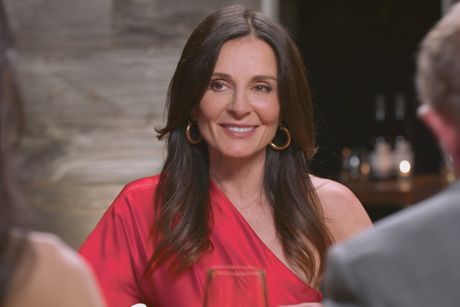
Restaurateur and Top Chef Canada judge Janet Zuccarini learned all about one of the themes of this season — resilience — from her father at an early age. Giacomo Zuccarini opened Toronto’s Sidewalk Caffè before Janet was even born; a legacy that would shape her outlook on restaurants in more ways than one. “The restaurant was really successful, with lineups out the door,” she says. “And one day, when my father took his first vacation to go back to Italy to visit his mother, his business partner emptied out his bank account and fled to Mexico with all the money, and my father had to shut the restaurant down.”
Although Giacomo would go on to have a long career in the espresso machine importing business, he warned his daughter about the travails of being a restaurateur. When Janet went against his wishes and opened up her first restaurant Cafe Nervosa (later renamed Trattoria Nervosa) in 1996, it caused a rift between them. “My father brought me up telling me almost every day to never go in the restaurant business,” she remembers. “And when I did, it upset my father so much that he did not speak to me for one year. It was horrible. Because it was so traumatic for my father to lose everything at one point, he felt that I did it on purpose, in a way. But we healed.”
Today, Janet’s Gusto 54 restaurant group — named in tribute to year her father first opened Sidewalk Caffè — spans multiple cuisines and cities, including Wall of Chefs judge Nuit Regular’s Pai and Kiin restaurants, Chubby’s Jamaican Kitchen, Gusto 101 and others in Los Angeles, but she’s never lost sight of those early lessons of adaptability and overcoming adversity.
Related: Eden Grinshpan’s Baba Ghanoush Recipe
This outlook would serve her well when the COVID-19 pandemic irrevocably changed the restaurant landscape. According to a December 2020 survey from industry group Restaurants Canada, eight out of 10 restaurants are either losing money or barely scraping by in today’s climate, and 48 percent of owners of single location restaurants are expecting to close within six months if conditions don’t improve. “It’s been absolutely devastating and has been a decimating experience for anyone with a small business, but the restaurant industry has been hit arguably the hardest during the pandemic,” says Janet. “With this third wave, we spent money that we don’t have to reopen outdoor dining just to be shut down again for the third time. Every time there’s a shutdown on short notice, you furlough all your team members that you just hired and paid to train, and figure out what to do with all of your inventory of food. We just keep getting one blow after the other. “
Viewers will be able to see this shift in the industry reflected in this season of Top Chef Canada, from behind-the-scenes logistics to Quickfire and Elimination Challenges. “The show is going to be very relevant, because not only did we have to shoot the show in such an extra safe way, with everyone on the set being tested every day they were on set, and of course wearing face shields and masks, and sitting separated at the judges’ table,” says Janet. Creating pandemic appropriate challenges was also an issue. “We had to address COVID, and what restaurants are going through and create challenges that represent how we’ve changed our way of relating to food and dining with regards to restaurants,” she says.
Overall, what Janet hopes the audience takes away from this season is a feeling of looking forward in terms of the restaurant industry. “As a restaurateur, I’ve shifted and adapted from selling groceries to takeout to home meal kits with chef tutorials over Zoom. We’ve opened four restaurants during the pandemic. The ideas have to keep coming, and going, and changing,” she says. “As the year has gone on, we’ve had different needs: people are not traveling, they’re not going to concerts, they’re starved for experiences. So, I have a lot of hope for the future.”
